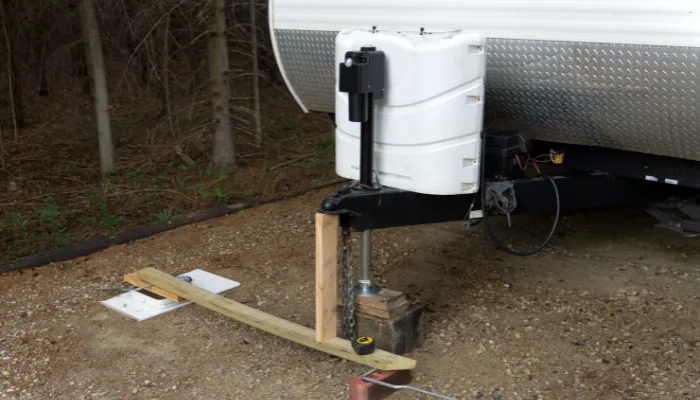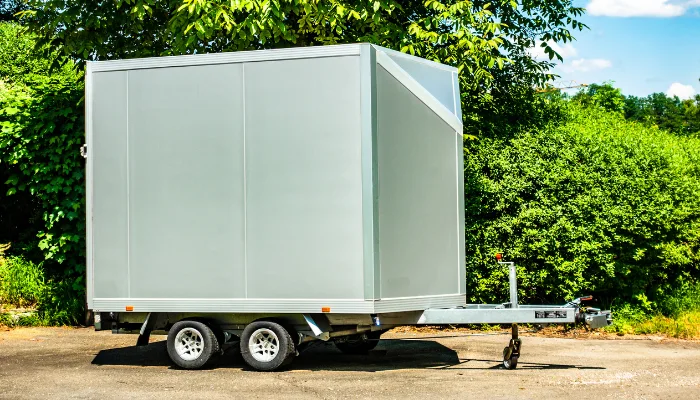This post may contain affiliate links which means I may receive a small commission for purchases made through the links. Learn More
If the tongue weight remains unchecked, chances are high that you’ll face serious consequences in the likes of sway, and instability. Almost 55000 accidents involve tow trucks and trailers, according to NHTSA reports. However, many of them happen due to unchecked, and unbalanced tongue weight.
So, it is very important to reduce tongue weight, but how can you reduce it? To reduce tongue weight on a trailer, redistribute weight within the trailer by moving heavy items to the middle or rear, and use a weight-distribution hitch to evenly distribute weight across the towing vehicle and trailer’s axles. I also recommend you use larger towing vehicles whose weight rating is higher.
I’ve done complete research and found a few ways that will help you to reduce your tongue weight. So, stay connected till the last word as more interesting things come your way.
Related Article: How to Set up a Weight Distribution Hitch?
What is Tongue Weight?
Tongue weight refers to the weight that is exerted on the hitch of a trailer by the load that is being carried. It is 10 to 15% of total weight of the trailer that are tow.
Don’t be confused, let me give you a simple definition.
When you tow a trailer with a load on it your hitch faces the load by the trailer and this is known as tongue weight. It is measured in pounds and is typically expressed as a percentage of the total trailer weight.
How much should be tongue weight?
The ideal range for tongue weight is between 10-15% of the total trailer weight. This means that if your trailer weighs 5000 pounds, the ideal tongue weight would be between 500 and 750 pounds. If your trailer weighs 2000 pounds, then tongue weight should be around 200 to 300 pounds. I’m sure that you won’t have any more confusion.
Why Should You Reduce Tongue Weight?
When towing a trailer, it is important to have the correct amount of tongue weight. If the tongue weight is too high then you’ll face the following problems;
- The trailer can sway, making it difficult to control.
- You won’t be able to drive at high speeds or in windy conditions.
- Due to overloading, the tire of the vehicle may burst
- Having too much tongue weight can cause the towing vehicle to be overloaded, which can lead to damage to the vehicle’s suspension and transmission.
Point: Keep in mind that having too little tongue weight can also be a problem. If the tongue weight is too low, the trailer can become unstable and can even become detached from the towing vehicle. So, balance in this regard is going to be perfect for sure.
Complete Method: How to Reduce Tongue Weight on a Trailer?

I’m sure that you now have complete basics about tongue weight and how important it is to maintain balance. With this assumption, I am going to give you some proven methods that will help you in reducing tongue weight.
There are several methods for reducing tongue weight on a trailer and their lists are given below
- Divide the weight within the trailer
- Use a weight distribution hitch,
- Use a larger or more capable towing vehicle.
- Lowering the height of the hitchball
- Maintain the payload
All these methods are very effective in reducing the tongue weight on a trailer. Don’t worry, I’m not over yet. In the section below, I’ll explain all these solutions completely.
1- Redistributing or Division of Weight
One of the simplest ways to reduce tongue weight is to redistribute the weight within the trailer. Don’t pull all of your stuff on one side of the trailer. However, put weight in equality. This can be done by moving heavy items to the middle or front of the trailer. This will help to distribute the weight more evenly and reduce the tongue weight.
You should follow the 60/40 formula meaning that 60% of the trailer’s weight should be on the front side of the trailer’s axle. 40% of the weight should be on the rear side. Following this ratio will be perfect.
Note: If you put more weight on the rear side, then you’ll face an issue of fishtail and your vehicle will give more power for carrying the trailer which ultimately increases the fuel mileage.
2- Using a Weight Distribution Hitch
Another effective way to reduce tongue weight is to use a weight distribution hitch. These hitches work by distributing the weight of the trailer more evenly across the towing vehicle and the trailer’s axles. This helps to reduce the amount of weight that is exerted on the hitch, and in turn, reduces the tongue weight.
Note: I would like you to use a high-quality and very strong weight distribution hitch that works effectively in distributing the weight.
3- Use a Larger or More Capable Towing Vehicle
If the tongue weight is still too high after redistributing the weight within the trailer and using a weight distribution hitch, upgrading to a larger or more capable towing vehicle may be necessary. A larger or more powerful vehicle will be able to handle more weight, which will reduce the tongue weight. I don’t recommend this as no one has the luxury of larger or bigger towing vehicles.
Using a larger towing vehicle is the solution for those who can afford another vehicle like if you’re a professional driver. When upgrading to a new towing vehicle, it is important to choose a vehicle with a higher towing capacity and a higher weight rating. This will ensure that the vehicle can handle the weight of the trailer and the load that is being carried.
4- Lowering the Height of the Hitch Ball
The hitch ball is part of the hitch that the trailer connects to. The height of the hitch ball is adjustable, and you can increase or decrease the height. by lowering the height, the weight on the tongue of the trailer is also lowered.
When you lower the height of the hitch, the ball will bring the trailer closer to the ground, which will help to reduce the weight on the tongue. This will make it easier to tow the trailer and reduce the risk of damage to the trailer or the vehicle.
5- Maintain the Payload
Payload is the weight of the things that you are hauling in the trailer. It is important to maintain the payload to avoid overloading the trailer, which can cause damage to the vehicle and the trailer, and put unnecessary stress on the tongue.
Overloading is dangerous as the trailer will increase the weight on the tongue, making it harder to tow and increasing the risk of damage. When you maintain the payload, it reduces the tongue weight on a trailer and makes it a more suitable and trouble-free towing experience.
Few Major Factors that Affect Tongue Weight
I want you to be equipped with complete information so that you don’t face any accident or anything that hurts you. Below are some major factors that can affect the tongue weight on a trailer and you should take them into your account.
- Trailer Weight
The weight of the trailer is the most obvious factor that affects tongue weight. The heavier the trailer, the more weight will be exerted on the hitch, and the higher the tongue weight will be.
- Distribution of Weight
The distribution of weight within the trailer can also affect tongue weight. If the majority of the weight is concentrated at the rear of the trailer, the tongue weight will be higher and vice versa.
- Towing Vehicle and Hitch
The weight of the towing vehicle and hitch can also affect tongue weight. A heavier towing vehicle or a higher capacity hitch can handle more weight and will have a lower tongue weight and vice versa.
Also Read: Should You Grease a Trailer Hitch Ball?
What Happens if the Trailer Tongue Weight Is Too Heavy?
In case the trailer tongue weight is too high, it is alarming for you as you’re exposed to the risk. You are more likely to face several issues with the towing vehicle and the trailer.
- Tyre burst
- Trailer instability
- Loss of traction
- Suspension sag
- Deadly accidents
To avoid these problems, you should always keep tongue weight within the recommended range, which is typically between 10-15% of the total weight of the trailer and its contents.
Does Tongue Weight Count as Trailer Weight?
I know you’re confused as it is a bit of a technical question. Let me simply explain. When you’re moving house and you’re loading up a moving truck with all your belongings, the weight of everything you’re loading is the total weight of the trailer.
But, when you’re hitching that moving truck to the tow vehicle, you have a rope connecting them, kind of like a tongue. The weight that is on that rope, the tongue, is called the tongue weight. It’s a specific part of the total weight, but it’s still included in the overall weight of the trailer.
In Gross Vehicle Weight Rating (GVWR), the tongue weight is also included which indicates that tongue weight is kind of counted just as trailer weight. I hope you will be able to understand now as I’ve explained everything in detail.
Frequently Asked Questions
Yes, there are many ways to adjust the weight. You can do that by moving the load on the trailer or by adjusting the weight distribution hitch.
Yes, an extended tongue can redistribute the weight on the trailer and potentially reduce the tongue weight. However, you should keep in mind that an extended tongue can also affect the stability of the vehicle.
Yes, using a smaller trailer can help reduce tongue weight. The smaller the trailer, the less weight will be exerted on the hitch, which will result in lower tongue weight. But using a smaller trailer will limit your cargo capacity.
Conclusion
There is no doubt that tongue weight is a critical aspect of towing a trailer, and you should always keep the correct amount of tongue weight to ensure safe towing. In this guide, I’ve given you complete information that will help you reduce the tongue weight and an easy and comfortable towing experience. See you in the next guide.

I’m Ahmad – the owner of this website and the writer of this post. I’ve spent 15 years in the automotive industry, especially among the hitches. What you’re reading is the experience of my 15 years.

